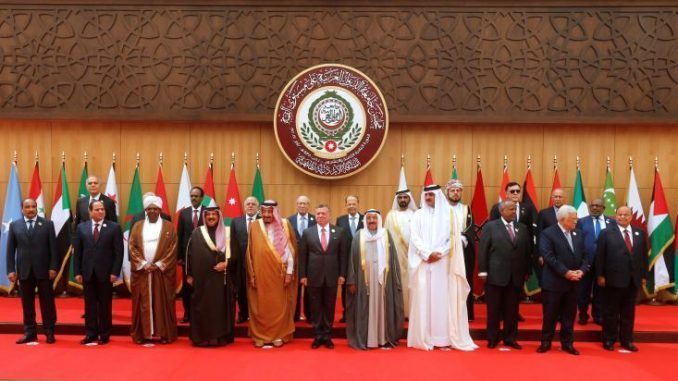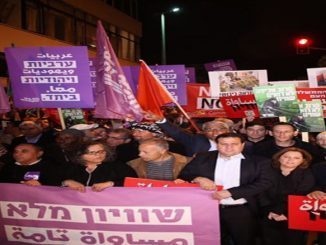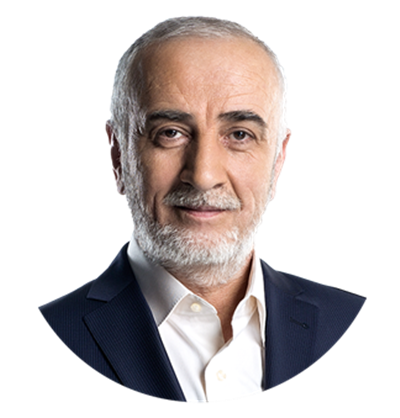
The 28th session of the Arab League’s annual ordinary summit started Wednesday morning at the Dead Sea in Jordan.
The one-day summit is attended by 18 Arab leaders, while King Mohamed VI of Morocco was not among them for unannounced reasons.
The United Nations Secretary General, Chairperson of the African Union Commission, Secretary General of the Organization of Islamic Cooperation (OIC), EU High Representative for Foreign Affairs and Security Policy, President of the Arab Parliament, Russian president’s personal envoy, personal envoy of the US president and the envoy of the French government, were among the attendees.
The conflicts in several Arab countries were to top the agenda of the meeting, particularly the situation in Syria, Libya and Yemen, as well as the Palestinian-Israeli conflict.
Jordan is hosting the summit after Yemen refused to host it due to the ongoing conflict in the country.
Two-state solution for Palestine
Arab leaders have demanded a two-state solution to the decades-long Israeli-Palestinian conflict amid increased unease over the stance of the United States under the administration of President Donald Trump.
Sheikh Tamim bin Hamad Al Thani, Qatar’s Emir, said: “We are required to jointly and seriously act to put pressure on the international community and the [UN] Security Council to reject the inception of an apartheid system in the 21st century.”
He added it was necessary “to deal firmly with Israel to force it to stop building settlements, implement international legitimacy resolutions, end the continuous violations against the Palestinian people, and lift the unjust siege imposed on the Gaza Strip”.
The summit’s host, King Abdullah of Jordan, said the creation of a Palestinian state alongside Israel remained the basis of any comprehensive peace deal.
“Israel is continuing to expand settlements and wreck chances of peace… There is no peace or stability in the region without a just and comprehensive solution to the Palestinian cause through a two-state solution,” he said.
King Abdullah, whose dynasty has custodianship over Muslim holy sites in al-Quds or Jerusalem, said any unilateral Israeli move to change the status quo in the Dome of the Rock and the Aqsa mosque would have “catastrophic” consequences for the future of the region, inflaming Muslim sentiment.
Palestinian President Mahmoud Abbas also criticized Israeli policy in his speech.
“The Israeli government has since 2009 worked on wrecking the two-state solution by accelerating the tempo of settlements and the confiscation of land,” Abbas told the Arab leaders.
UN Secretary-General Antonio Guterres reiterated the calls, telling summit participants via video conference that two states are the “only path to ensure that Palestinians and Israelis can realize their national aspirations and live in peace, security and dignity”.
Trump’s calls
Trump rattled Arab and European leaders in February by indicating he was open to a one-state solution, upending a position taken by successive US administrations and the international community.
Trump later told Reuters news agency in an interview he liked the concept of a two-state solution, but he stopped short of reasserting a US commitment to eventual Palestinian statehood, saying he would be “satisfied with whatever makes both parties happy”.
This week Israeli Prime Minister Benjamin Netanyahu said he was committed to work with Trump to advance peace efforts with the Palestinians, but he also stopped short of reiterating a commitment to a two-state solution.
Trump’s Middle East envoy Jason Greenblatt met Abbas ahead of Wednesday’s summit, the second such meeting in two weeks. Trump has also invited Abbas to the White House.
“[Greenblatt] had a lot of queries and we are answering them to complete the picture in their minds and speaking as Arabs in one language,” Abbas said, adding he had told the envoy that Palestinians remained as firm as ever in their demand for an independent state.
The Palestinians and Arabs want Arab East al-Quds- which Israel captured in a 1967 war and later annexed in a move not recognized internationally – as the capital of a future state encompassing the Israeli-occupied West Bank and the Gaza Strip.



